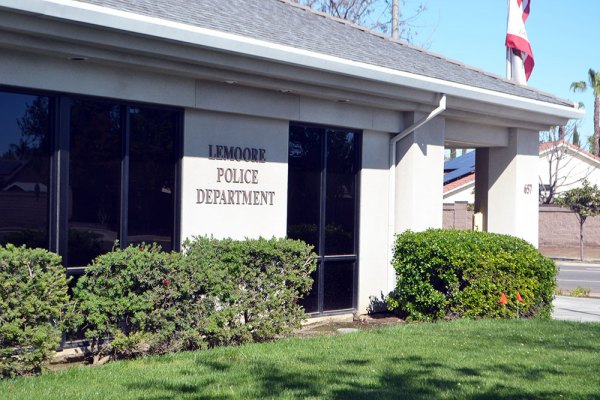Spike in local crime attributed to release of state's inmates as part of COVID-19 early releases housing prisoners in local motels

Unfortunately, according to Lemoore’s police department, the recently released inmates contributed to a spike in local crime statistics. With such a significant spike of crime in a short amount of time, Lemoore investigators, along with the Major Crimes Task Force, began an investigation into the root cause of the problem.
At the city of Lemoore’s last council meeting (August 18), Lemoore Police Chief Michael Kendall reported that the local motel had been part of a program housing inmates released early from prison.
He told council members that the program, known as Project Hope, placed inmates at a local motel, operated by the Wyndham Hotel chain. Since that last council meeting, local officials and the owner of the motel have resolved the issue. The hotel is no longer enrolled in Project Hope.
The motel is no longer accepting reservations without a current identification card and credit card. Since the motel made the changes, Lemoore’s police department has not made any arrests or received any more complaints.
Released inmates, with few options, are sent to hotel rooms through the program run by the corrections department. According to local officials, the state is booking the rooms and paying with a credit card.
Project Hope was created to protect people released from prison during the COVID-19 pandemic and the local communities to which they are returning. The initiative provides free hotel accommodations to inmates released from state prison who need to quarantine or isolate due to exposure to COVID-19.
The California Department of Corrections (CDCR) has the authority to expedite releases from state prison under Government Code section 8658, which allows alternative confinement or release in any case in which an emergency endangering the lives of inmates has occurred or is imminent.
Kings County’s two state prisons, at Avenal and Corcoran, have been hit hard by COVID-19 infections. On Sunday, August 30, the Kings County Department of Public Health reported 115 additional cases. Since the pandemic began, there have been six inmate deaths in Kings County.
The county’s two state prisons have accounted for 2,442 cases, and currently, there are 1,062 active cases. Health officials report that 1,374 persons associated with the two prisons have recovered.
From the start of the pandemic through the end of this month, the number of inmates released varies from 8,000 by the end of August to 11,000 prisoners released early – largely nonviolent offenders with less than a year to serve — which could reduce the California prison population to a 30-year low.
But, according to The Marshall Project, which collects data on COVID-19 infections in state and federal prisons, at least 102,494 cases of coronavirus cases have been reported in the nation’s lockups.
A homeless program, entitled Project Room Key, is also part of the state’s game plan to provide shelter for those living on the street with nowhere to go.
“The state enacted two projects, project Room Key and Project Hope. Project Room Key provides for housing, usually hotel rooms for homeless people that would otherwise have nowhere to wait out this pandemic or to shelter because they’re under quarantine because they’re positive for it,” said Kendall during a presentation for council members at their August 18 regular council meeting.
Only three council members were present for the August 18 meeting. Mayor Eddie Neal was absent.
Unfortunately, according to Kendall, the release of convicts under the COVID-19 umbrella led to an increase in Lemoore’s crime statistics and negative relations with local officials.
Lemoore City Manager Nathan Olson told The Leader recently that the city was not consulted before the arrival of released prisoners. “I was appraised of it a couple of days ago, last week when Chief Kendall gave me an update about it. We were not notified in advance,” he said.
Kendall elaborated on the program. “Project Hope is another project to alleviate, I guess, some of the overcrowding issues inside the prisons to create some distance for the inmates and to otherwise get those individuals who are being released from the prison system, again, a place to stay, like a hotel room.”
It was around April 12 or 13 that the state began releasing inmates, some of them arriving in Lemoore. According to Kendall, since those dates, the Lemoore Police Department initiated approximately 345 incidents at the local motel, resulting in over 44 criminal cases and at least 46 arrests.
During a recent weekend, the police department conducted about 40 hours of surveillance at the local motel and witnessed 60 to 70 hand-to-hand drug transactions. Officers counted at least 100-plus vehicles coming in and out of the motel’s parking lot as subjects visited the cars, essentially to purchase drugs, indicated Lemoore’s chief.
“These arrests are mainly drug arrests. When they’re under the influence of methamphetamines, cocaine, heroin, we do get some violent calls over there,” added Kendall.
He said that during one observation, police officers responded to a subject in the parking lot with a knife. “Luckily, that turned out all right for us. He was taken into custody and booked into jail for being under the influence as well as brandishing a knife.”
Nationwide, said The Los Angeles Times, more than 100,000 people were released from state and federal prisons between March and June.
More Images
- Deputy sheriff stops vehicle with no plates, finds suspect with illegal gun
- Tachi Palace Casino Resort announces this week the launch of a new mobile app
- Tachi Palace, Tribal Council sign agreement with Mechoopda Indian Tribe to develop new casino
- In midst of a pandemic, Lemoore's citizens enjoy their annual Christmas Parade
- Annual Lemoore Christmas Parade, despite the pandemic, will continue, but with a twist as parade watchers join the parade
- Spike in local crime attributed to release of state's inmates as part of COVID-19 early releases housing prisoners in local motels
_0.jpg)

.jpg)



